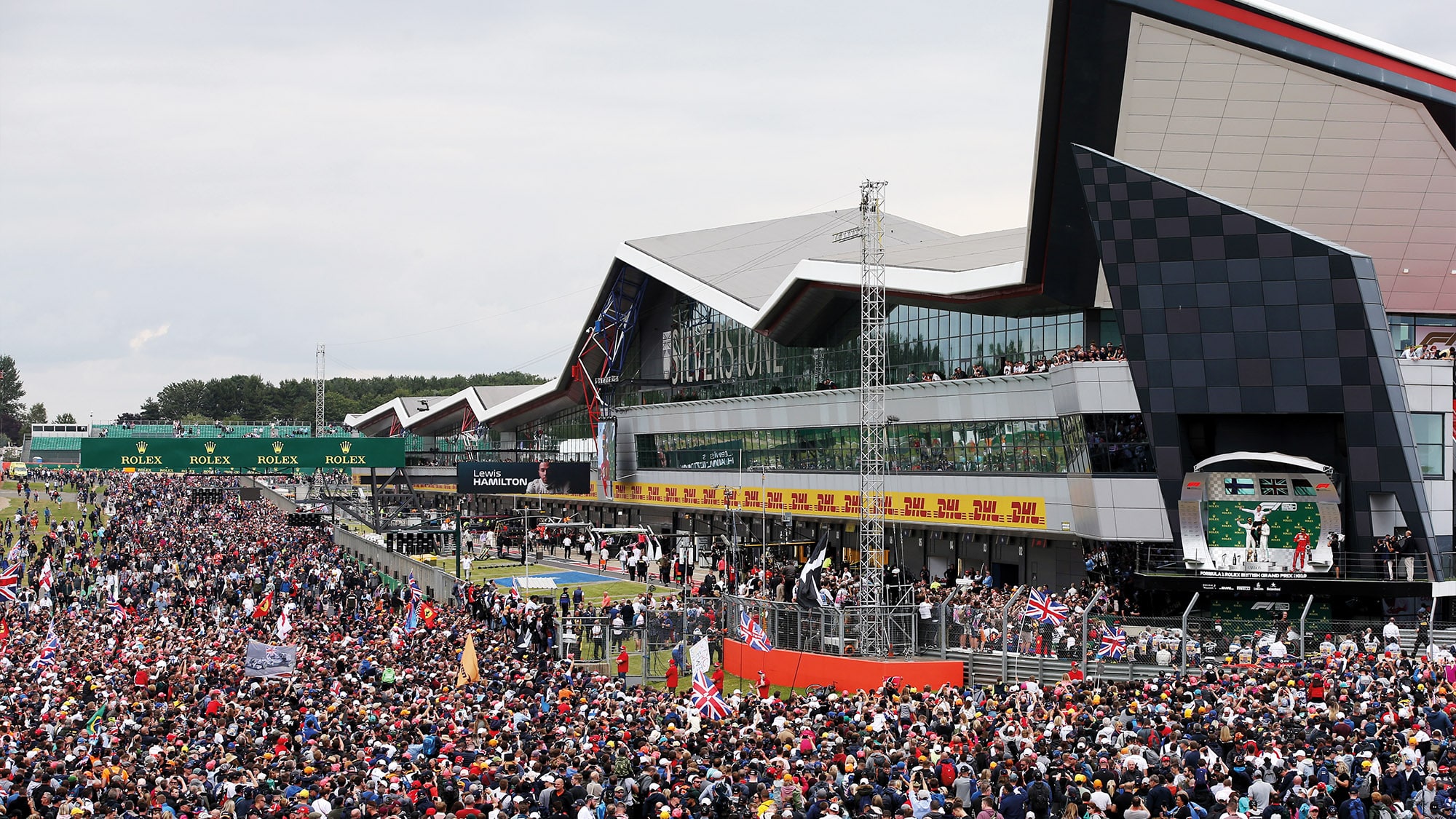2021 British Grand Prix preview
Formula 1’s first sprint qualifying is just one of the pulls at Silverstone. Simon Arron gives a taste of what to expect at this year’s spectacle of motor racing
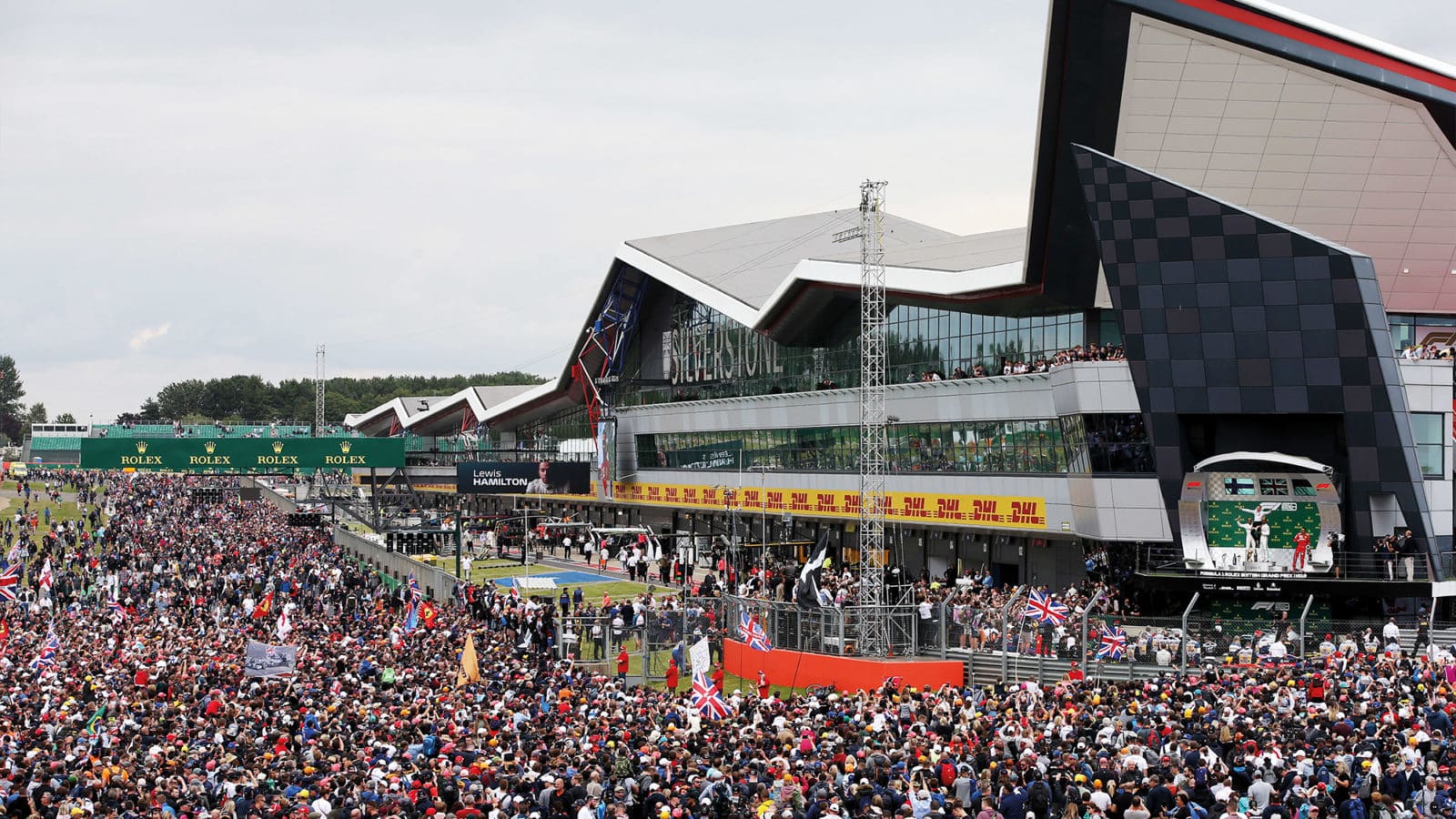
There has always been a sense of occasion about the British Grand Prix – and a wonderful 60-year-old photo by Bernard Cahier illustrates the point. In 1961, long before the days of mass media saturation in sport, the Frenchman stood to the side of the track at Aintree and captured the scale of the crowd, the packed 30-car grid and an unmistakable whiff of anticipation.
The Lancashire weather was fairly miserable, but it’s an engaging moment, frozen forever in just a fragment of a second.
There is no debris fencing, nothing separates the cars on track from a naked pitlane, run-off areas were a distant figment of someone’s imagination and a halo was something you were most likely to see on a Christmas card. The structure and texture of grand prix racing might have changed beyond measure over the intervening years, but there are a few notable constants – not least the fact that the British Grand Prix remains an event, every bit as much a part of the domestic sporting tapestry as the Grand National, Wimbledon, the FA Cup Final or a Lord’s Test.
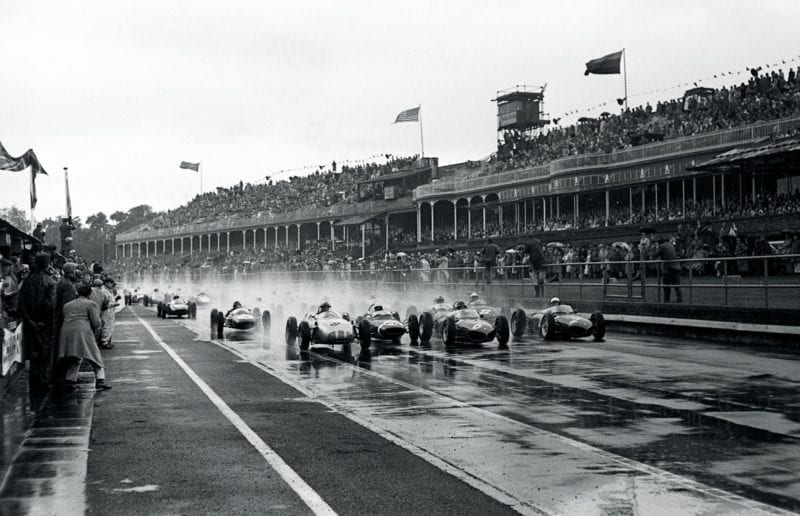
Where are the bands, the women’s racing series and the artisanal food? The British GP in 1961 at Aintree was a world away from the modern Silverstone experience
Bernard Cahier/Getty Images
Covid restrictions may yet scupper some access for spectators this year, although Silverstone is hoping to allow full access. But capacity crowd or restricted crowd the race weekend itself on July 16-18 still promises to one of the most exciting of recent years.
Lewis vs Max
Lewis Hamilton has notched up a record seven victories in the British GP and has been beaten only once since 2014 (three years ago, when he finished second to Sebastian Vettel’s Ferrari). He might have had the best car beneath him for the vast majority of Formula 1’s hybrid era, but he has made dependably good use of it – and has also managed to conjure a few victories when at a notional disadvantage, a gift that hallmarks all the true greats.
In sharp contrast, when Mercedes teammate Valtteri Bottas qualified on pole for the Portuguese Grand Prix earlier this year, the bookies made him only third favourite to win… and presciently so.
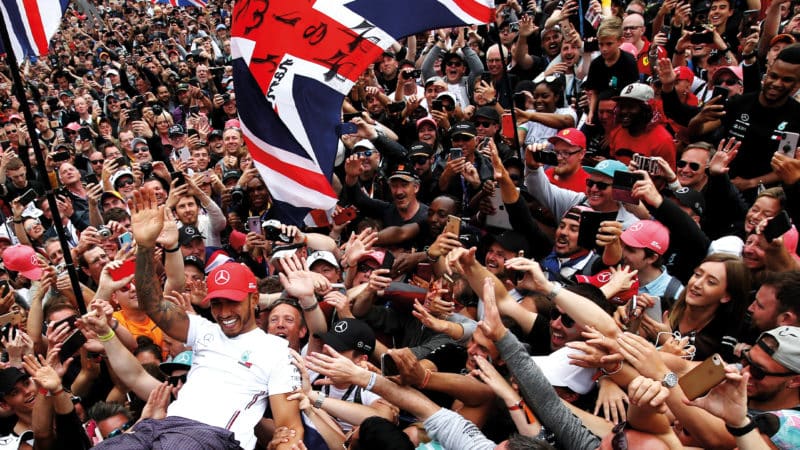
Hamilton took his sixth British GP win in 2019, surpassing Jim Clark’s record; his seventh came the following season
Barely had the campaign commenced when the more hysterical end of the punditry spectrum began proclaiming this as ‘one of the greatest seasons ever’, their rationale being that the renewed potency of Red Bull, in partnership with Honda, would enable Max Verstappen to challenge Hamilton on a regular basis – and perhaps even beat him.
Such judgments were perhaps best left until after the final race, rather than the first, but the early signs indicate that Mercedes faces its most earnest challenge since hybrid V6 turbos were introduced, a period during which no other team has yet won a world title. If the race passes off without mechanical foible or major incident (cloudbursts, track invasions by defrocked priests and so on), it is hard to look beyond Hamilton or Verstappen (winner of the most recent World Championship grand prix here – the 70th Anniversary race, second leg of the Silverstone F1 double-header on last year’s oddball calendar).
Sprint qualifying
Some purists might be up in arms, but F1’s qualifying format has already been subjected to endless tweaks – two sessions, one session, qualifying tyres, control tyres, one car at a time, everybody running together, the artifice of variable fuel loads and, more recently, the knock-out format – so it’s not as though years of unbroken tradition have suddenly been ripped asunder by the first use of a sprint race to settle Sunday’s grid.
“A 100km sprint race will settle the starting order for the main feature”
The weekend’s format is simple: F1 practice sessions on Friday and Saturday mornings, then qualifying on Friday afternoon to determine a grid for the following day’s 100km sprint race, which will settle the starting order for the main 52-lap feature. F1 president and CEO Stefano Domenicali called it “testament to our united efforts to engage fans in new ways while ensuring we remain committed to the heritage and meritocracy of our sport”.
Will it work if adopted in the longer term? In all probability, yes. The British Touring (né Saloon) Car Championship existed for many years on a diet of one race per weekend. That eventually became two and teams didn’t much like the idea of adding a third, but the motion was passed, swiftly becoming accepted as the norm. For more on the new format, see over the page.
Supporting cast
In a bid to help teams prune their running costs, the FIA F2 and F3 championships no longer share the undercard at selected grands prix but appear separately, with three races at each of a reduced number of competitive weekends.
It will be F2’s turn at Silverstone, which hosts the 10th-12th races of the season – two shorter events (21 laps) on Saturday and the main feature (29) on Sunday morning. Dan Ticktum (Carlin) has been an F2 front-runner for the past 18 months and is likely to be a strong contender on home soil, but is up against a rich seam of talented juniors, many of them already affiliated to F1 teams. The 17-year-old Frenchman Théo Pourchaire (ART) is worth watching, should he recover from a fractured arm sustained in Baku in time to race. An F4 champion in 2019 and runner-up in last season’s FIA F3 series, he controlled this year’s Monaco feature race with a maturity that belied his years.
The all-female W Series joins the F1 roster at selected grands prix this year and has a single 30-minute race on Saturday, while the Porsche Supercup follows F2 – and one of the daily historic demos – on Sunday.
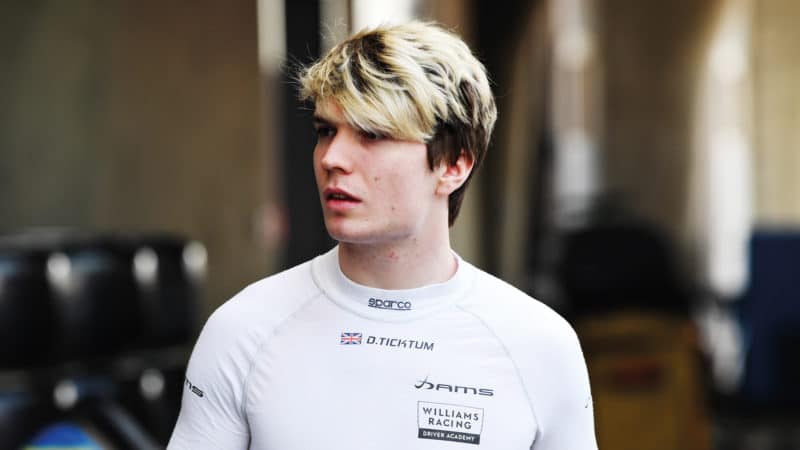
Dan Ticktum is currently fifth in the F2 standings
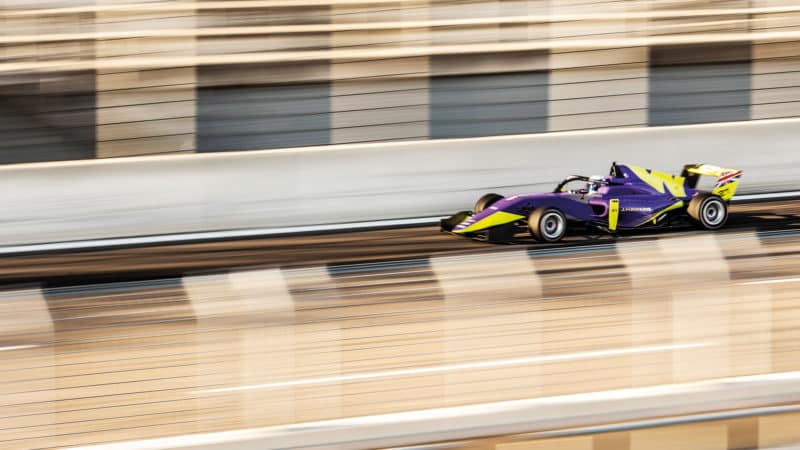
The W Series makes its Silverstone debut
Ticket info
As ever, the value option – three-day general admission – was snapped up swiftly. At the time of writing, general admission tickets were still available for Friday (from £99) and Saturday (from £149), but the only way to get last-minute access to the GP is to purchase a grandstand seat – though some of the favoured vantage points have sold out. Availability will diminish during the build-up to race weekend.
For over-18s who want to hang around and minimise the risk of becoming snared in post-race traffic, there is an after-show party with live music; tickets from £100.
As we went to press, the Government announced an extension of Covid restrictions by four weeks, which includes the Silverstone weekend, but tickets were still available to buy. Check silverstone.co.uk for updates.
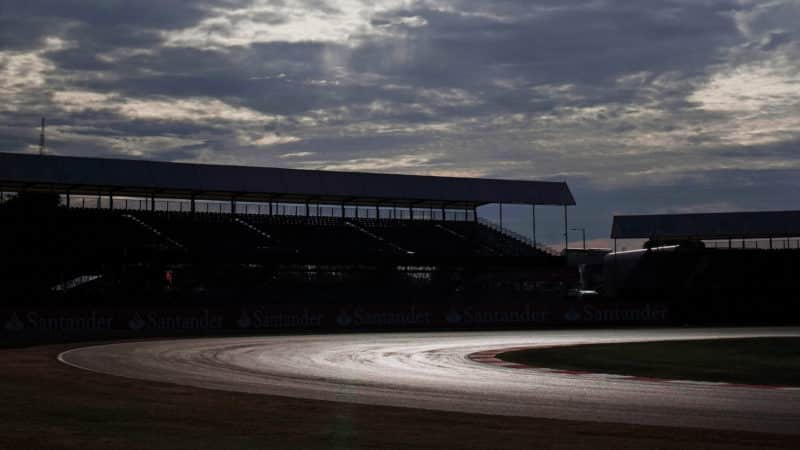
Luffield gives extensive views and is covered
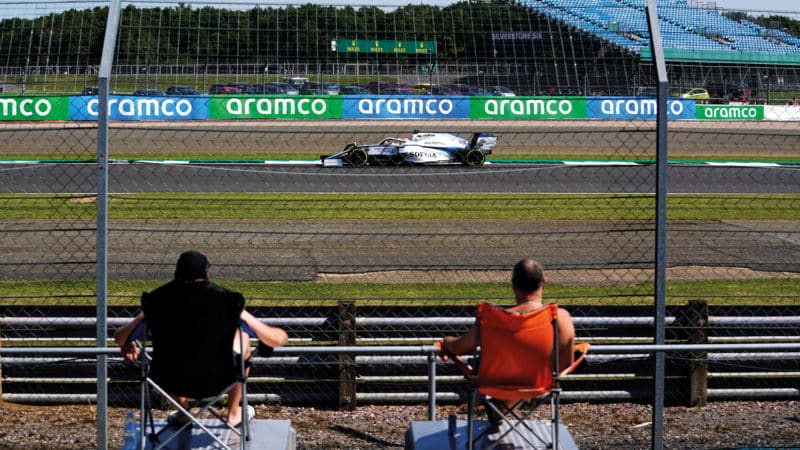
an empty stand at Silverstone in 2020
Motor Sport’s top tips
Even if you have purchased a seat for three days, exploration is highly recommended – as are bicycles, if you can pack them practically.
Much has changed since Silverstone began life 73 years ago as a figure of eight, with little more than oil drums to separate cars as they approached each other from opposite ends of the same runway. One of the best bits – Bridge Corner, a fast, uphill right-hander created in 1991 – was bypassed in the name of ‘progress’ when the Arena loop was added to the track in 2010 (though it is still there as a forlorn reminder of past glories, and accessible to all).
For all that, the section from Copse through Maggotts, Becketts and Chapel is one of the most thrilling anywhere in the sport, a cocktail of extraordinarily high speeds and improbably brisk directional changes – highly recommended for watching qualifying and/ or high-speed simulation runs.
Formula 1 cars might no longer be as elegant as they once were, but Silverstone nevertheless provides a wonderful stage to showcase their art.
